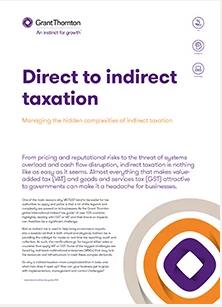-
Accounting Advisory
Our accounting advisory team help businesses meet their complex financial reporting requirements. The team can support in applying new financial reporting standards, IFRS/ US GAAP conversions, financial statement preparation, consolidation and more.
-
Payroll
Our team can handle your payroll processing needs to help you reduce cost and saves time so that you can focus on your core competencies
-
Managed accounting and bookkeeping
Outsourcing the financial reporting function is a growing trend among middle market and startup companies, as it provides a cost-effective way to improve the finance and accounting function. Our team can help with financial statement preparation, consolidation and technical on-call advisory.
-
Accounting Advisory
Our team helps companies keep up with changes to international and domestic financial reporting standards so that they have the right accounting policies and operating models to prevent unexpected surprises.
-
Crypto Accounting Advisory Service
Our team can help you explore appropriate accounting treatment for accounting for holdings in cryptocurrencies, issuance of cryptocurrencies and other crypto/blockchain related accounting issues.
-
ESG Reporting and Accounting
As part of our ESG and Sustainability Services, our team will work with you on various aspects of ESG accounting and ESG reporting so that your business can be pursue a sustainable future.
-
Expected Credit Loss
Our team of ECL modelling specialists combine help clients implement provisioning methodology and processes which are right for them.
-
Finance Transformation
Our Finance Transformation services are designed to challenge the status quo and enable your finance team to play a more strategic role in the organisation.
-
Managed Accounting and Bookkeeping Services
Outsourcing the financial reporting function is a growing trend among middle market and startup companies, as it provides a cost-effective way to improve the finance and accounting function. Our team can help with financial statement preparation, consolidation and technical on-call advisory.
-
Business Tax Advisory
Our business tax team can help you navigate the international tax landscape, grow through mergers and acquisitions, or plan an exit strategy.
-
Corporate Finance
Our corporate finance team helps companies with capital raising, mergers and acquisitions, private equity, strategic joint ventures, special situations and more.
-
Financial Due Diligence
From exploring the strategic options available to businesses and shareholders through to advising and project managing the chosen solution, our team provide a truly integrated offering
-
Valuations
Our valuation specialists blend technical expertise with a pragmatic outlook to deliver support in financial reporting, transactions, restructuring, and disputes.

-
Sustainability with the ARC framework
Backed by the CTC Grant, businesses can tap on the ARC Framework to gain access to sustainability internally, transform business processes, redefine job roles for workers, and enhance productivity. Companies can leverage this grant to drive workforce and enterprise transformation.

-
Business Tax Advisory
Our business tax team can help you navigate the international tax landscape, grow through mergers and acquisitions, or plan an exit strategy.
-
Corporate Tax Compliance
Our corporate tax teams prepare corporate tax files and ruling requests, support you with deferrals, accounting procedures and realise tax benefits.
-
Tax Governance
Our Tax Governance Services are designed to assist organisations in establishing effective tax governance practices, enabling them to navigate the intricate tax environment with confidence.
-
Goods and Services Tax
Our GST team supports organisations throughout the entire business life-cycle. We can help with GST registration, compliance, risk management, scheme renewals, transaction advisory and more.
-
Transfer Pricing
Our Transfer Pricing team advises clients on their transfer pricing matters on and end-to-end basis right from the designing of policies, to assistance with annual compliance and assistance with defense against the claims of competing tax authorities.
-
Employer Solutions
Our Employer Solutions team helps businesses remain compliant in Singapore as well as globally as a result of their employees' movements. From running local payroll, to implementing a global equity reward scheme or even advising on the structure of employees’ cross-border travel.
-
Private Client Services
Our private client services team provides a comprehensive cross section of advisory services to high net worth individuals and corporate executives, allowing such individuals to concentrate on their business interests.
-
Welfare and benefits
We believe that a thriving team is one where each individual feels valued, fulfilled, and empowered to achieve their best. Our welfare and benefits aim to care for your wellbeing both professionally and personally.
-
Career development
We want to help our people learn and grow in the right direction. We seek to provide each individual with the right opportunities and support to enable them to achieve their best.
From pricing and reputational risks to the threat of systems overload and cash flow disruption, indirect taxation is nothing like as easy as it seems. So how do you manage the hidden complexities of indirect taxation?
Almost everything that makes value added tax (VAT) and goods and services tax (GST) attractive to governments can make it a headache for businesses as a lot of the legwork and complexity is passed to them.
And as indirect tax is used to help bring e-commerce imports into a taxable net that is both virtual and physical, indirect tax is providing the catalyst for moves to real-time tax reporting, audit and collection.
Indirect tax is in the spotlight
Compared to direct taxation (eg corporate and personal income tax), indirect taxes are generally cheaper for tax authorities to collect and easier to police. Indirect taxes pass a lot of the burden of tax evaluation on to companies by attaching themselves to multiple transactions rather than their outcomes (eg income and expenditure).
VAT, GST and sales taxes also allow tax authorities to apply a flat rate tax, albeit with the complication of minimal turnover thresholds for businesses and exemptions for certain goods and services. Further impetus has come from the competition to attract MNEs into local markets, with increases in indirect taxation giving scope to cut headline corporate tax rates.
Introducing the Netflix tax
While these benefits have always been there, the overwhelming argument for an increasing number of policymakers is the opportunity to use indirect taxation as an effective way to tax digital imports and other aspects of the virtual economy.
Australia is one of the countries to have applied this so-called ‘Netflix tax’. Foreign businesses are liable for a flat rate GST of 10% on imported services and digital products supplied to Australian consumers. Also poised to follow suit are
- Malaysia – through a proposed tax on imported business-to-business (B2B) services from 1 January 2019 and a similar business-to-consumer (B2C) levy from 1 January 2020.
- Canada – the province of Quebec has its own Netflix tax obligations on nonresident organisations making supplies of services or intangibles to consumers and non-registered businesses, effective from 1 January 2019.
- Singaporean tax authorities are planning to require overseas vendor registration as part of their moves to bring imported e-commerce into the tax net.
Increasing the take
While a lot of the focus is on new applications of VAT/GST (eg the introduction of VAT in the Gulf Cooperation Council states), just as significant are increasing rates and penalties within many countries and the administrative obligations in many jurisdictions. As our Grant Thornton global International Indirect tax guide highlights. Tax authorities are also removing exemptions (eg fuel in the Philippines) and tightening up rules (eg changes to holding corporation regulations in Canada).
Implications for your business
- Rising prices from charging VAT/GST could dent demand, though sales taxes have a potentially higher impact on prices as sellers can’t reclaim the taxes they pay to suppliers.
- Risk of double taxation as some territories continue to apply tax at point of production and others at consumption.
- Risk of being caught up in Netflix tax trawl and requirement for new registration adding significantly to compliance costs and risks of not conforming with misunderstood regimes.
- Unpopularity of VAT/GST creates significant reputational risks. This includes the risk of being seen to take advantage of exemptions or no physical presence/permanent establishment (PE) designation.
Managing transition and change
While businesses can’t reclaim sales taxes, VAT/GST are harder to implement and manage given the multi-stage nature of the VAT/GST.
Unlike a sales tax, VAT/GST is levied on the difference between the purchase and the resale price – the 'value add'. As such, businesses can generally reclaim as well as pay tax, and therefore the net result should in theory be to tax just the profit on the supply of goods and services.
In practice, this is not the case as labour and payroll costs generally do not attract GST/VAT and the tax systems impose significant operational costs and risk of error. This includes collating and reporting multiple supply data. The challenges are compounded by the fact that implementation and changes in VAT/GST are now routinely being used as the catalyst for moves to digitise real-time tax reporting, audit and collection.
There is also a lag between paying and reclaiming tax, which can stretch out for months and even in some cases years. The complexities of managing payment and claiming refunds are heightened by multiple and not always clear exemptions.
Implications for your business
- Clearly, some prices will rise with any new indirect system. But companies often under-estimate the additional impact of higher systems and compliance costs. A key question is how to remain price competitive under the new system.
- Implementation demands are often under-estimated, leading to under-resourcing and inadequate preparation time. The big danger is regarding VAT/GST as simply a sales tax or as a fairly straightforward change, which only affects the tax and wider finance teams. In reality, there are multiple issues and complexities to consider and address across the organisation, including sales, marketing and public relations.
- Delays in reclaiming tax can lead to significant cash flow problems. These can be exacerbated by poor or slow identification of reclaimable payments to suppliers.
Rethinking tax
According to Lorraine Parkin, Head of Tax at Grant Thornton Singapore, Indirect Tax now accounts for more that 20% of global fiscal revenues and this percentage is likely to increase. It can be argued that it’s a regressive form of taxation. It can equally be argued that it’s a progressive form of taxation. Either way, it’s here to stay with the burden of collection and effective tax management falling on business.
It’s not just the immediate demands of VAT/GST that are complex and challenging, but the extent to which it forms part of wider shifts in how businesses are taxed (production to consumption), where they’re taxed (new definitions of PE) and how they engage with tax authorities (real-time tax).
Rather than looking at indirect taxation in isolation, it’s therefore important to look at how it fits into the wider future of tax, systems modernisation and engagement with tax authorities.
The better prepared your business is, the bigger the opportunity. If you’re not sufficiently aware, mobilised and strategically and operationally ready to go-live, the bigger the risks of adverse profit and loss impacts, non-compliance, tax investigation, reputational damage and cash flow problems.
If you would like to discuss any of the areas raised, please contact your Grant Thornton contact or email us at enquiries@sg.gt.com



